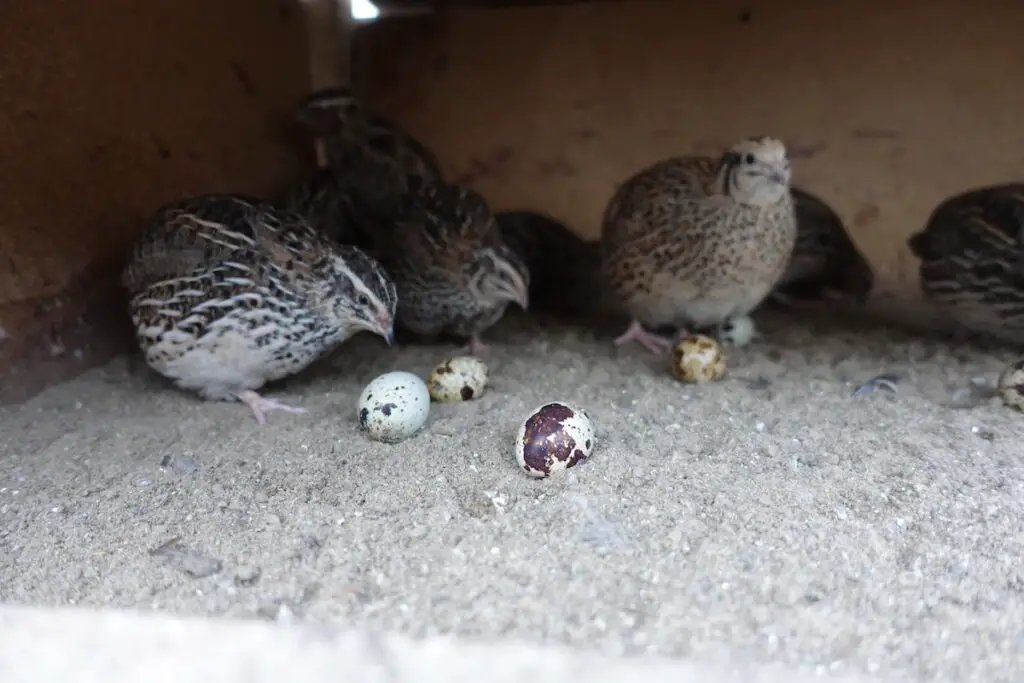Rearing quail on your backyard farm can give you a supply of fresh, tasty eggs all year round. Depending on how many quail you have, eggs can be used for family meals or sold to provide income for a small home business.
Quail start laying eggs between 6 and 8 weeks and reach their full potential by 10 weeks. They produce eggs all year round in the right conditions. You can expect them to lay in the afternoon.
For those who are not familiar with quail eggs, they are smaller than chicken eggs and have a lovely speckled shell. Quail eggs are tasty and offer a great source of nutrition. They are often offered as part of fine-dining dishes, making them somewhat of an exotic and rare specialty.
If you’re having trouble with your quail laying eggs, and you’re not getting any or just few, check out this article I wrote on what may be the underlying problem.
Learn how to raise your own quail and have an unlimited supply of eggs and meat.
Let’s look more closely at when quail lay eggs.
When do quail start laying eggs?
Quail can start laying eggs as early as 5 1/2 to 6 weeks old. As a comparison, chickens only start to lay eggs at around 18 to 22 weeks old. So you will get quail eggs much faster.
I find that most of my regular quail start to lay eggs at around 7 weeks, and my jumbo quail start a bit earlier. They then ramp up egg production and reach their full potential at 9 to 10 weeks.

On average, a healthy adult quail will lay one egg per day. Factors such as age, health, and living conditions can affect egg production.
If you don’t know much about birds, it’s important to mention that only quail hens (female quail) will lay eggs, but roosters won’t. They are useful to breed hens, which ensures that the eggs you’re getting are fertile. If you don’t plan to hatch your own quail, you can have a flock of hens only.
If you plan on rearing quail to sell eggs, it is important to know more or less how many eggs you can expect to get. A quail’s average lifespan in the wild is around 2 to 3 years. In captivity, they may live longer due to safer surroundings. You can do your calculations based on this time frame to work out how many eggs (more or less) one quail will give you. Plan for around +/- 300 eggs per year for 2 years. By comparison, chickens can produce eggs for up to 5 years or more, and will produce more eggs in their life than a quail.
Here’s a helpful comparison article I wrote on quail eggs, duck eggs, and chicken eggs, which you can read.
When in the year do they lay?
Many new home farmers expect to have an egg-laying season during the year. This is not the case when it comes to quail. Quail will happily lay eggs all year round provided that they have sufficient light.
If your quail are outdoors with no supplemented light, egg laying will decrease in the winter months as there are less hours of light. If you are rearing your quail indoors and supplementing light, you can expect your quail to lay eggs all year round. They need at least 14 of natural light, a combination of natural and artificial light, or solely artificial light, and they will be happy.
I find that my quail are not affected by the weather. If they have sufficient light, food, and feel safe, they will lay eggs in summer, winter, spring, and fall.
When during the day do they lay?
For most small farmers, quail lay eggs in the afternoon. I consistently get eggs between 2pm and 6pm. Rarely do I get any before 2pm, and never before 12 noon. When it comes to the evening, I rarely get eggs after 6pm, and never after 7pm.
Remember that quail need light, either natural or artificial, to lay eggs. If you keep them indoors in very dark conditions, they won’t lay eggs at any time, even though it is daytime outside.
Where to find your quail eggs
If you keep your quail in a coop, you will easily find the eggs. Quail are not too fussy, so eggs may be scattered around the cage and may even end up being trampled by the birds. You can buy cages that have a built-in tray that allows the eggs to roll gently out of the cage. This will give you a greater yield and make them very easy to collect.
I set up an indoor area of my cage with a big sandbox for the birds, and I find most of the eggs in the sand. It seems to me that this is their preferred location when they want to lay an egg because it’s the closest to their natural habitat.

Quail that run around outdoors may offer more of a challenge. While they do enjoy nesting in small bushes, shrubs, or quieter spots, they are just as happy dropping their eggs wherever they happen to be. You may have to walk around carefully and pick up the eggs you can see, and search amongst your plants for others. Going to the aviary is an egg-hunt each time.
Factors that influence egg production
Quail that are happy and healthy will lay eggs regularly. If your quail are not laying eggs as expected, this could be due to a number of factors. Let’s look at fawhat influences egg production.
Quality of the feed – Providing high-quality feed is essential for ensuring the health and well-being of quail. Quail need a diet that is high in calcium and protein.
In the first few weeks, the emphasis is on protein as it helps the healthy development of the quail. As a rule of thumb, you should aim giving them feed with a minimum of 20% protein. Skip this, and your birds will mature later, and may end up having different problems, including maturing later and not having sufficient body-mass.
When they start laying, the focus shifts to calcium, which is essential for egg production. Keep in mind that these tiny birds need to crank out an egg each day, whose shell is made out of calcium. Give them feed that contains at least 2% of calcium. If this amount is significantly less, you will end up with eggs with soft shell like this one.
Amount of light – Light is a vital factor to ensure that quail produce eggs. Your birds need at least 14 hours of natural, artificial, or a combination of both, per day.
Age of the bird – Quail can start laying eggs at around 5 to 6 weeks, and peak between 10 weeks and 1,5 years. Older birds will lay fewer eggs and eventually stop laying altogether.
Molting time – Like most birds, quail living outdoors in natural conditions will molt at certain times during their life. Your birds will lose their feathers to make way for new ones. This process uses up valuable energy and egg laying can drop or stop altogether during this time, but will pick up again once the molting period is over.
Type of bird – Egg production differs between different species of quail. Jumbos, for example, lay around 270 eggs per year, while regular Coturnix quail lay average around 300-330. Button quail also lay around 200 or more, while Bobwhite quail lay fewer eggs, at around 150 to 200 per year.
Too many roosters can stress hens – I always ensure that I have the correct balance of roosters to hens in my coop. Too many roosters can result in fighting and aggression and even the death of your birds. Too many roosters will stress the hens and stressed hens don’t lay eggs. Plan on keeping 1 rooster for every 4 to 5 hens.
Stress factors in general – Quail are sensitive birds and changes in their environment can easily stress them out. If your birds are stressed, egg production will decline sharply. Predators, changes in location, dramatic or sudden changes in lighting, and overcrowding will stress your birds. Ensure that you provide a safe and constant environment at all times for your quail.
Final thoughts
Under the correct conditions, quail will lay eggs all year round, giving you a source of tasty, nutritious eggs for eating or selling. Ensure that your quail feel safe, have a balanced diet, are not overcrowded, and have at least 14 hours of light per day. My quail offer me eggs daily, and yours can too!
Happy Quailing!

